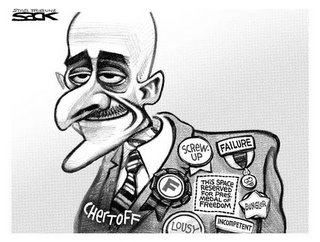After Katrina A Series of Previously Unreleased E-mails Shows an Administration in Chaos in the Wake of the Storm.
 At 9 p.m. on Monday, Aug. 29, 2005, as Hurricane Katrina swamped New Orleans, FEMA Director Michael Brown appeared on "Larry King Live" and announced, "This is a catastrophic disaster... We've got some storm surges that have come across the levees." Less than an hour later, at 9:51, Brown received ane-mail from White House chief of staff Andy Card, who told him he had been kept "well-informed about your reports. Anything you want me to do??" Brown replied, "Thanks for writing, Andy. This is a bad one. Housing, transportation and environment could be long term issues."
At 9 p.m. on Monday, Aug. 29, 2005, as Hurricane Katrina swamped New Orleans, FEMA Director Michael Brown appeared on "Larry King Live" and announced, "This is a catastrophic disaster... We've got some storm surges that have come across the levees." Less than an hour later, at 9:51, Brown received ane-mail from White House chief of staff Andy Card, who told him he had been kept "well-informed about your reports. Anything you want me to do??" Brown replied, "Thanks for writing, Andy. This is a bad one. Housing, transportation and environment could be long term issues."
Card may have been concerned, but he wasn't in a position to be of much help. Like President Bush, Vice President Dick Cheney and homeland-security adviser Frances Townsend, Card was on vacation when the hurricane struck. Back at the White House, the job of monitoring the storm was left to Kenneth Rapuano, Townsend's deputy. At 10 p.m., Rapuano left the White House to go home for the night, believing everything was under control.
It wasn't. Half an hour later, at 10:30 p.m., the Homeland Security Operations Center sent out a two-page bulletin reporting massive flooding and bodies floating in the water. Rapuano later told Congress that no one at the White House woke him to tell him about the report, and he didn't realize the extent of the damage until 6 the following morning, when another Homeland bulletin warned that "it could take months to dewater" the city. Only then did it begin to dawn on top administration officials, including the president, how grave a human—and political—disaster they were facing.
Six months later, there still isn't a clear account of what Bush and his top aides were doing in the hours and days after the levees crumbled and the misery set in. The prolonged confusion is partly explained by the White House's refusal to turn over many of the records and e-mails requested by the Senate and a special House committee investigating the fiasco. In a blistering report last week, the Republican-led House committee said the poor response "cost lives" and "prolonged suffering."

0 Comments:
Post a Comment
Subscribe to Post Comments [Atom]
<< Home